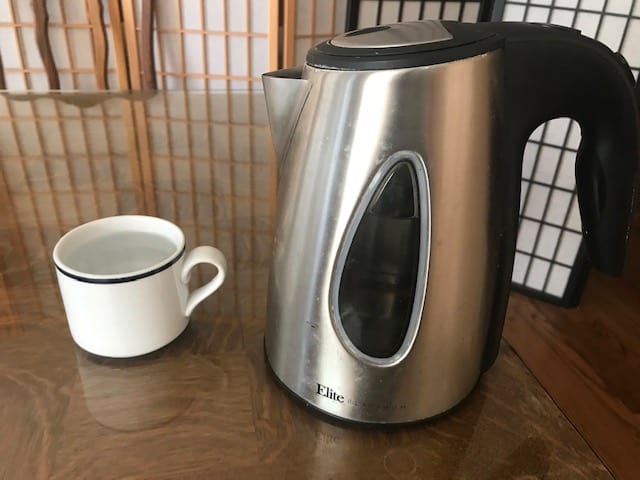Why Hot Water Is Better Than Cold
I tell my patients that warm beverages are good, room temperature neutral, while cold beverages are contra-indicated, especially with food.
What is rationale for favoring warm beverages over cold? From an Ayurvedic standpoint this is easy to understand. The Sanskrit word for digestion, “agni” also means “fire.” So we can think of our digestion in the same terms as a gas stove top, or camp fire. Anything warm stimulates the fire, and is helpful, while cold foods or drinks extinguish the digestive fire, and are thus potentially harmful. The concern here is that if agni is weakened, then we don’t digest our food properly. The biproducts of such improper digestion, which in Ayurveda are referred to as “ama”, then get absorbed into the physiology. This ama, or toxin accumulation, in turn, is the ground floor where disease gets in.
Suppose you are on a camping trip and you build a campfire. Then, just as you are reaching to put your potatoes into the fire to cook them, your kid or grandkid comes over and dumps a huge bucket of ice on your campfire as a practical joke. Well its not so funny, your potatoes are not going to cook. In the same way, people should not drink cold beverages, especially with food.
In contrast, if I have a patient who is having some medical problem attributable to weak digestion with ama accumulation (BTW probably 80% or so of chronic medical problems will have weak digestion with ama accumulation as at least part of the cause), I will advise the patient to purchase a thermos, fill it with plain hot water, and sip it throughout the day. Frequent sips of plain hot water heats up the digestive fire, melts away the ama, and is a good low budget detoxification procedure for just about anybody. Twenty bucks for the thermos, and you are good for the next decade!
Is there anything to this from a modern medical perspective? Several lines of evidence suggest yes. First, there is evidence that warm beverages, compared to room temperature or cold, promote gut motility. Randomized controlled trial data have shown that in post abdominal surgery patients warm water intake resulted in improved first flatus expulsion and gut motility (Caliskan, 2016). Researchers have shown that in patients with esophageal achalasia, difficulty with swallowing will be aggravated by cold beverages while improved with hot beverages. Specifically, hot water consumption was found to reduce lower esophageal sphincter resting pressure, assist lower esophageal sphincter relaxation, and shorten contraction duration of the esophageal body and relieve symptoms. Cold water consumption in contrast was noted to have the opposite effects. (Ren, 2012)
One could fairly postulate from these data that warm beverages may stimulate, with cold beverages inhibiting, parasympathetic nervous system influences on the digestive tract. The parasympathetic nervous system sends a “rest and digest” signal to the physiology, promoting gastrointestinal secretions, gut motility, and relaxation and dilatation of both gastrointestinal sphincters and blood vessels. In contrast, iced cold foods and drinks may be promoting the opposite sympathetic nervous system “fight or flight” response, which shuts down gut activity.
There are other potential mechanisms by which the temperature of beverages could impact digestion. It seems reasonable to expect that at lower temperatures your digestive enzymes might not function as efficiently.
Beyond the GI tract, drinking warm, as opposed to cold beverages, can have other benefits as well. For example, investigators (Sanu, 2008) have demonstrated advantages of warm beverages on respiratory health. These investigators examined the impact of a hot drink in 30 subjects with viral upper respiratory symptoms. Compared to a room temperature drink, the hot drink provided added relief from symptoms of sore throat, chilliness, and tiredness. From an Ayurvedic standpoint this is easy to understand. Anything cold will aggravate kapha dosha, which in turn generates mucus.
If you are skeptical about this, it is not necessary to wait for someone else to do more research. Do a little experiment on yourself. Take 10 or 20 seconds to sensitively note how much mucus is in your respiratory tract. Then go grab a 12-ounce glass of ice water and down it. A minute or two later, repeat the data collection. Very simple! Clinically, over consumption cold beverages, especially cold sweet beverages, is an under-recognized root cause of chronic respiratory congestion, particularly for children.
Finally, if you always boil your water and drink it warm, you will protect yourself from contracting bacterial and other infectious diseases that may be transmitted through contaminated water.
Caliskan C, Bulut H, Konan A. The Effect of Warm Water Intake on Bowel Movements in the Early Postoperative Stage of Patients Having Undergone Laparoscopic Cholecystectomy: A Randomized Controlled Trial. Gastroenterol Nurs. Sep-Oct 2016;39(5):340-7. doi: 0.1097/SGA.0000000000000181.
Ren Y., Ke M., Fang X., et. al. Response of esophagus to high and low temperatures in patients with achalasia. J Neurogastroenterol Motil. 2012 Oct;18(4):391-8. doi: 10.5056/jnm.2012.18.4.391.
Sanu A, Eccles R. The effects of a hot drink on nasal airflow and symptoms of common cold and flu. Rhinology. 2008 Dec;46(4):271-5. PMID: 19145994.

